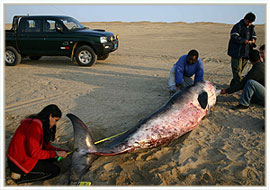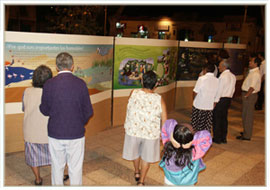Our work
Programs
ACOREMA moves forward its initiatives through development of two programs:
Research Program
This program is aimed to build the scientific arguments for a better understanding of the marine biodiversity and its current status, to base management measures and to support the conservation program. To this end, basic information about threatened species from the identification and assessment of conservation problems to specific subjects, including distribution, behavioral patterns and habitat use of common bottlenose dolphins (Tursiops truncatus) and marine otter (Lontra felina); mortality, identification of critical feeding areas and genetic studies of marine turtles, especially green turtle (Chelonia mydas) and leatherback turtle (Dermochelys coriacea). Also, support is provided to the annual census of Humboldt penguin (Spheniscus humboldti) to evaluate the variability in the population size.
Conservation Program
This program contributes to restore the balance between man and the marine environment. It comprises several actions in both formal and non-formal education frames to mitigate biodiversity loss, especially in the case of threatened species and their environment. It is worth noting: lectures at schools, teacher workshops, training for guides, tourism students and park rangers, etc. Also awareness campaigns, outdoor exhibits, production and distribution of educational resources (books, guides, booklets, leaflets, posters, stickers, radio spots, etc.); setting up environmental interpretive centers and organization of activities inside them. Further, the conservation program establishes contacts with governmental offices and private entities to disseminate information, to generate opinion and to provide recommendations. These are some of the strategies to motivate, raising awareness and to inform the community on the need to improve the conservation status of the marine biodiversity as well as the coastal and marine environment.

